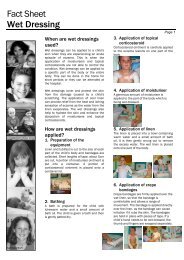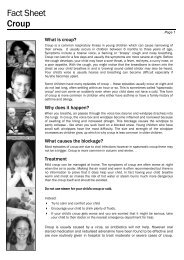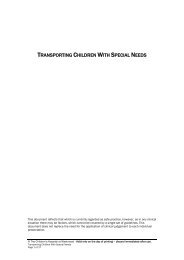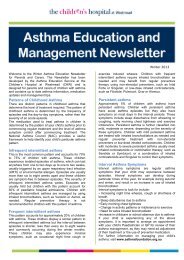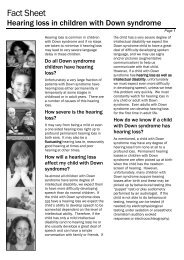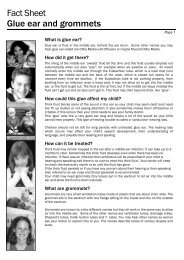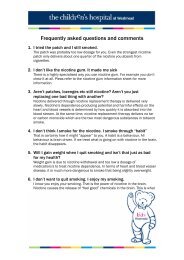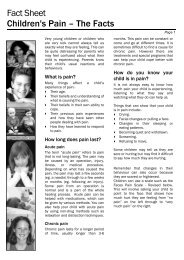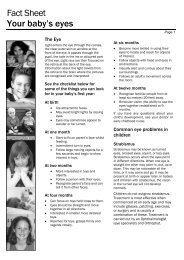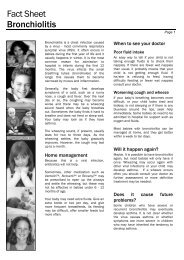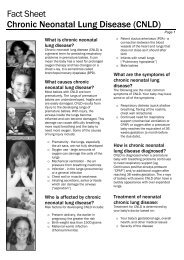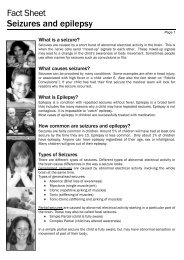Siblings of children with disabilities - Kids Health @ CHW
Siblings of children with disabilities - Kids Health @ CHW
Siblings of children with disabilities - Kids Health @ CHW
Create successful ePaper yourself
Turn your PDF publications into a flip-book with our unique Google optimized e-Paper software.
Information for parents and pr<strong>of</strong>essionals<br />
<strong>Siblings</strong> <strong>of</strong> <strong>children</strong> <strong>with</strong> <strong>disabilities</strong><br />
Being the brother or sister <strong>of</strong> a child <strong>with</strong> a disability can be a challenging experience. All siblings<br />
experience friendship, love, acceptance, jealousy, rejection, loneliness, anger, sadness, humour and<br />
a range <strong>of</strong> other emotions as a result <strong>of</strong> their interactions <strong>with</strong> their brothers and sisters, but when<br />
the brother or sister has a disability these experiences can be magnified and experienced very<br />
intensely. Just imagine some <strong>of</strong> the possible experiences a child may encounter <strong>with</strong> a brother or<br />
sister <strong>with</strong> a disability:<br />
Embarrassment: “I don’t want to be part <strong>of</strong> this” - particularly in public <strong>with</strong> friends.<br />
Anger: “Why me!”- for example in relation to a disabled sibling who is destructive.<br />
Sadness: A sense or isolation, or loneliness: at the ‘loss’ <strong>of</strong> the brother or sister the child ‘might<br />
have had’.<br />
Frustration: at not being able to play <strong>with</strong> the disabled sibling, or at having to miss out on<br />
specific events or experiences because <strong>of</strong> the needs <strong>of</strong> the disabled sibling.<br />
Jealousy: at the amount <strong>of</strong> time and affection the sibling <strong>with</strong> a disability may have to receive,<br />
and thereby take from the other <strong>children</strong>.<br />
Guilt: “Why didn’t it happen to me?” - or at not being able to do sufficient to help.<br />
Injustice: “It’s not fair!” - at having to miss out, or having to be a ‘third parent’, or at seeing a<br />
sibling receive preferential treatment.<br />
Over-protectiveness: towards their brother or sister that may interfere <strong>with</strong> their school and<br />
leisure activities, and their relationships <strong>with</strong> peers and friends.<br />
On the positive side, siblings <strong>of</strong> <strong>children</strong> <strong>with</strong> <strong>disabilities</strong> <strong>of</strong>ten grow up to have a more mature and<br />
caring attitude towards people <strong>with</strong> <strong>disabilities</strong> than would otherwise be the case. They may develop<br />
a more tolerant attitude in general to people who are ‘different’, and may develop skills and values<br />
that would be unusual in other <strong>children</strong> their age. Two issues <strong>of</strong>ten arise for siblings <strong>of</strong> <strong>children</strong><br />
<strong>with</strong> <strong>disabilities</strong>:<br />
1. Their experiences <strong>of</strong> disability <strong>of</strong>ten parallel their parents’ experiences.<br />
2. <strong>Siblings</strong> <strong>of</strong> <strong>children</strong> <strong>with</strong> <strong>disabilities</strong> usually receive less personal support than their parents in<br />
coming to terms <strong>with</strong> a brother or sister <strong>with</strong> a disability.<br />
What to do<br />
What to do about isolation, loneliness and loss<br />
Help the child to maintain social contacts <strong>with</strong> friends from school and sporting teams etc.<br />
Arrange to have ‘special time’ put aside for the child, so that he/she can feel special. Respite<br />
care is a wonderful way to assist in making this possible.<br />
Page 1 <strong>of</strong> 3<br />
<strong>Siblings</strong> <strong>of</strong> <strong>children</strong> <strong>with</strong> <strong>disabilities</strong>
What to do about over-identification<br />
Reassure the child that nothing is going to happen to him or her.<br />
Ensure that the child is enjoying a rich and varied life, and avoid undue reference to the<br />
disabling condition that the sibling may have.<br />
Provide the child <strong>with</strong> accurate and age-appropriate information so that when he or she asks<br />
questions about their disabled sibling, or the specific disability, you can answer them honestly<br />
and accurately.<br />
What to do about resentment<br />
This is <strong>of</strong>ten similar to feelings <strong>of</strong> isolation and loss.<br />
Again, arrange ‘special times’ for the child so that he or she does not feel left out or neglected.<br />
Ensure that specific achievements are acknowledged and praised publicly.<br />
Explain the reasons for the differential ‘treatment’ being given to the disabled sibling.<br />
Negotiate the specific roles and responsibilities that arise from having a child <strong>with</strong> a disability in<br />
the family.<br />
What to do about embarrassment<br />
Acknowledge the child’s embarrassment, and give them ‘space’.<br />
In other words, let them be embarrassed. But teach appropriate ways and places to be<br />
embarrassed.<br />
What to do about guilt<br />
Acknowledge the child’s feelings <strong>of</strong> guilt. Talk <strong>with</strong> the child about his or her feelings.<br />
Allow opportunities for the child to ‘work through’ the conflicting feelings that generally<br />
accompany guilt.<br />
Provide accurate and age appropriate information so that the child can understand the situation<br />
more clearly.<br />
Answer the child’s questions as accurately and honestly as you can.<br />
<strong>Siblings</strong> groups<br />
Every now and again, but far too infrequently, a disability organisation or group will <strong>of</strong>fer a<br />
‘<strong>Siblings</strong> Workshop’, or a ‘<strong>Siblings</strong> Group’. These are semi-formal opportunities for the siblings<br />
<strong>of</strong> <strong>children</strong> <strong>with</strong> <strong>disabilities</strong> to come together and share their experiences. They are chances to<br />
explore their reactions to their situation knowing that other <strong>children</strong> are experiencing similar things.<br />
<strong>Siblings</strong> support groups usually include most <strong>of</strong> the following elements:<br />
A period <strong>of</strong> time for the group to come together and ‘bond’. This is usually achieved through<br />
specific activities that encourage trust and group cohesion.<br />
Activities and discussions which allow the <strong>children</strong> to express their experiences, both positive<br />
and negative, about being the sibling <strong>of</strong> a child <strong>with</strong> a disability.<br />
Then there are opportunities for the participants to reflect upon their experiences and develop<br />
new insights into their feelings and reactions.<br />
Hopefully there is personal growth through these experiences, and the opportunity to make new<br />
friends who share similar experiences.<br />
Page 2 <strong>of</strong> 3<br />
<strong>Siblings</strong> <strong>of</strong> <strong>children</strong> <strong>with</strong> <strong>disabilities</strong>
<strong>Siblings</strong> groups and workshops are usually conducted by pr<strong>of</strong>essionals who work in the field <strong>of</strong><br />
disability. Some parents also become involved as they realise the benefits that flow from these<br />
groups. There are no organisations that are specifically funded or exist only to run siblings groups.<br />
These groups are additional roles that pr<strong>of</strong>essionals and organisations take on when they have the<br />
time, funding, and motivation. The importance <strong>of</strong> siblings groups cannot be underestimated, and it<br />
is a pity that so little opportunity exists to provide this outlet for the brothers and sisters <strong>of</strong> <strong>children</strong><br />
<strong>with</strong> <strong>disabilities</strong>.<br />
Neil Nicoll<br />
Psychologist, CHERI<br />
Psychologist No. PS0003047<br />
Disclaimer: This fact sheet is for educational and personal use only. Please consult <strong>with</strong> other pr<strong>of</strong>essionals, where appropriate, to ensure this information is suitable to<br />
your needs.<br />
Page 3 <strong>of</strong> 3<br />
<strong>Siblings</strong> <strong>of</strong> <strong>children</strong> <strong>with</strong> <strong>disabilities</strong>



